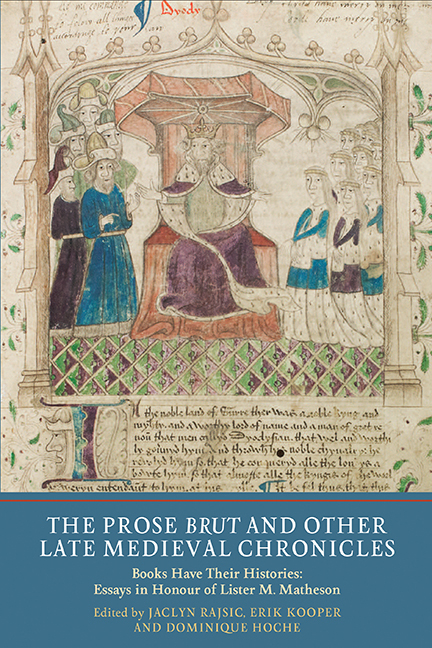 The Prose Brut and Other Late Medieval Chronicles
The Prose Brut and Other Late Medieval Chronicles from Part III - Receptions and Afterlives of Late Medieval Chronicles
Published online by Cambridge University Press: 05 July 2016
Go, litel bok, go, litel myn [historie]
Chaucer, modifiedTHE Brut chronicle family has many branches, as Lister Matheson and others have increasingly brought to light. Although Castleford's Chronicle, the immensely long verse chronicle to be discussed here, is surely one of the lesser relations and had, to my knowledge, no direct progeny, nevertheless it is a valuable witness to the development of the Brut tradition in a northern English context. This chronicle is known to exist in only one manuscript, which, as I will show, can be traced from a Yorkshire origin, as the fifteenth-century product of an imperfect collaboration between two main scribes and a rubricator; to a probable sojourn in Westminster or London in conjunction with its ownership by an avid book collector who was, by one dubious account, perhaps also a murderer; to an eighteenth-century transition to the Continent among the household goods of a Londoner serving as a minor official in Germany, where it acquired its present designation as Göttingen, Niedersächsische Staats- und Universitätsbibliothek, MS 2o Cod. hist. 740 Cim. This itinerary shows the continuing circulation of a somewhat aberrant version of the underlying Brut narrative across regional and national distances and across time.
Recent studies of England's medieval book culture have emphasized the importance of diversified and interrelated networks of writers, readers and owners of books, not only in London as the main metropolitan center but also in other cities and in local and regional contexts, including Yorkshire and other parts of the North of England, which were active sites of production and ownership. At York, as John Friedman has shown, scriveners, flourishers and illuminators had formed a gild by 1425, and there are records of the activities of individual and amateur scribes, as well as professional book production collaborations that included a scribe, a binder, an illuminator and sometimes an editor or overseer.
To save this book to your Kindle, first ensure no-reply@cambridge.org is added to your Approved Personal Document E-mail List under your Personal Document Settings on the Manage Your Content and Devices page of your Amazon account. Then enter the ‘name’ part of your Kindle email address below. Find out more about saving to your Kindle.
Note you can select to save to either the @free.kindle.com or @kindle.com variations. ‘@free.kindle.com’ emails are free but can only be saved to your device when it is connected to wi-fi. ‘@kindle.com’ emails can be delivered even when you are not connected to wi-fi, but note that service fees apply.
Find out more about the Kindle Personal Document Service.
To save content items to your account, please confirm that you agree to abide by our usage policies. If this is the first time you use this feature, you will be asked to authorise Cambridge Core to connect with your account. Find out more about saving content to Dropbox.
To save content items to your account, please confirm that you agree to abide by our usage policies. If this is the first time you use this feature, you will be asked to authorise Cambridge Core to connect with your account. Find out more about saving content to Google Drive.